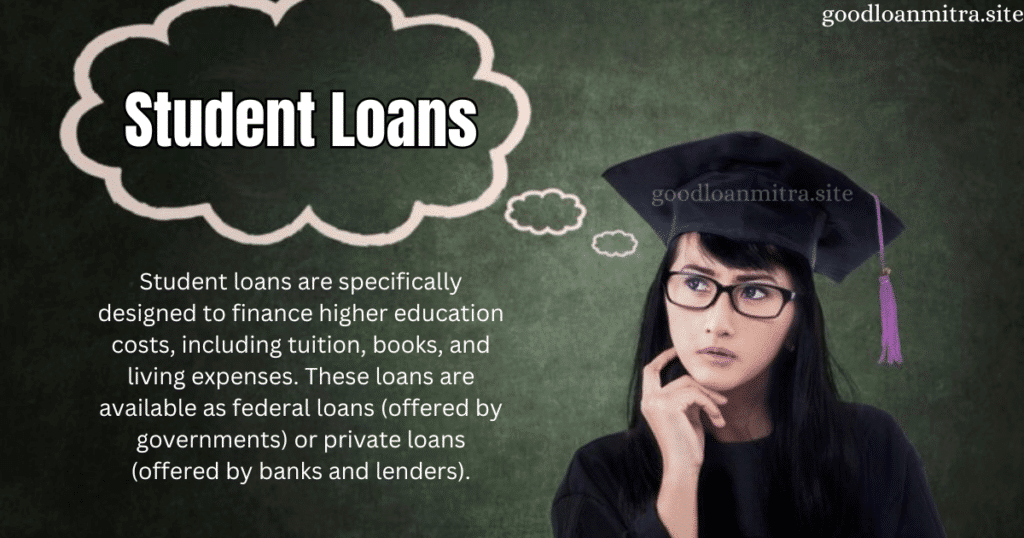Whether you dream of owning a home, starting a business, pursuing higher education, or traveling the world, financing these goals often requires a financial boost. Loans can help you bridge the gap between your current financial situation and your aspirations. However, with so many loan options available, choosing the right one can feel overwhelming. This article explores the top five loan options to help you achieve your dreams while making informed decisions.
Key Takeaways: Loan Options
- Personal Loans for Flexibility: Ideal for a wide range of needs, from travel to home renovation, personal loans offer flexibility with minimal documentation and no collateral requirement.
- Education Loans for Career Growth: Tailored for students pursuing higher education, these loans often feature low interest rates, moratorium periods, and repayment plans aligned with career earnings.
- Home Loans for Property Ownership: Designed for purchasing or constructing a home, these loans typically offer long repayment tenures and tax benefits, making them an affordable path to homeownership.
- Auto Loans for Vehicle Purchases: Perfect for buying cars or bikes, auto loans usually provide competitive interest rates and flexible repayment terms, enabling you to own your dream vehicle sooner.
- Business Loans for Entrepreneurs: Whether you’re starting a venture or expanding operations, business loans offer substantial funding options with tailored repayment structures to fuel your entrepreneurial aspirations.
1. Personal Loans

Overview
Personal loans are versatile, unsecured loans offered by banks, credit unions, and online lenders. These loans are ideal for various needs, including debt consolidation, medical expenses, or funding a vacation. Since personal loans are unsecured, you don’t need collateral, but lenders assess your creditworthiness before approval.
Key Features
- Loan Amount: Typically ranges from $1,000 to $50,000.
- Repayment Terms: Usually 2 to 7 years.
- Interest Rates: Range from 5% to 36%, depending on credit score and lender.
Pros
- No collateral required.
- Quick approval and disbursement.
- Flexible usage.
Cons
- Higher interest rates for borrowers with poor credit.
- Fixed repayment terms may lack flexibility.
Best For
- Individuals with a strong credit score needing funds for short- to medium-term goals.
2. Home Loans
Overview
Home loans, or mortgages, are designed to help individuals purchase or refinance homes. These loans are secured, meaning the property serves as collateral. With various options like fixed-rate, adjustable-rate, and government-backed loans, home loans cater to a wide range of borrowers.
Key Features
- Loan Amount: Based on property value and borrower’s income.
- Repayment Terms: Typically 15 to 30 years.
- Interest Rates: Fixed or variable, often lower than unsecured loans.
Pros
- Long repayment terms make monthly payments manageable.
- Tax benefits on interest payments in many countries.
- Builds equity over time.
Cons
- Requires a down payment (often 10% to 20%).
- Foreclosure risk if payments are missed.
Best For
- First-time homebuyers, property investors, or individuals looking to refinance their mortgage.
3. Student Loans

Overview
Student loans are specifically designed to finance higher education costs, including tuition, books, and living expenses. These loans are available as federal loans (offered by governments) or private loans (offered by banks and lenders).
Key Features
- Loan Amount: Depends on education costs and loan type.
- Repayment Terms: Can range from 10 to 25 years.
- Interest Rates: Lower for federal loans; higher for private loans.
Pros
- Federal loans often have low interest rates and flexible repayment options.
- Some loans offer deferment or forbearance during financial hardship.
- May qualify for forgiveness programs (e.g., Public Service Loan Forgiveness).
Cons
- Private loans may have high interest rates and stricter terms.
- Accumulating debt can be overwhelming for students.
Best For
- Students pursuing higher education who need financial assistance beyond scholarships and grants.
4. Small Business Loans
Overview
Small business loans provide funding to entrepreneurs and business owners for starting, expanding, or managing a business. These loans can be secured (requiring collateral) or unsecured, depending on the lender.
Key Features
- Loan Amount: Varies widely, from $5,000 to $5 million or more.
- Repayment Terms: Typically 1 to 25 years.
- Interest Rates: Vary based on lender and borrower’s credit profile.
Pros
- Helps businesses scale operations and improve cash flow.
- Diverse options, including SBA loans, term loans, and lines of credit.
- Tax-deductible interest in many cases.
Cons
- Lengthy application process for certain loans.
- May require collateral or a personal guarantee.
Best For
- Entrepreneurs and small business owners seeking capital for growth, inventory, or equipment.
5. Auto Loans

Overview
Auto loans are specifically designed for purchasing vehicles. These loans are secured, with the car serving as collateral. Auto loans are offered by banks, credit unions, and dealerships.
Key Features
- Loan Amount: Based on vehicle cost and borrower’s credit profile.
- Repayment Terms: Usually 3 to 7 years.
- Interest Rates: Depend on credit score, loan term, and lender.
Pros
- Enables the purchase of a vehicle without upfront payment.
- Competitive interest rates for borrowers with good credit.
- Flexible repayment options.
Cons
- Depreciation of the vehicle reduces its value over time.
- Risk of repossession if payments are missed.
Best For
- Individuals needing a reliable vehicle but lacking upfront funds.
How to Choose the Right Loan Option
When selecting a loan, consider the following factors:
- Purpose: Clearly define why you need the loan and ensure the loan type aligns with your goals.
- Interest Rates: Compare rates across lenders to secure the most affordable option.
- Repayment Terms: Opt for terms that balance monthly affordability and total interest costs.
- Credit Score: Understand how your credit profile impacts loan eligibility and terms.
- Collateral Requirements: Determine if you’re comfortable offering assets as security.
Also Read : Business Loans : Types, Benefits, and How to Apply
Conclusion
Loans play a crucial role in turning dreams into reality, whether it’s owning a home, earning a degree, or starting a business. Understanding the top loan options—personal loans, home loans, student loans, small business loans, and auto loans—can help you make informed decisions that align with your goals. By assessing your financial needs, comparing options, and evaluating repayment terms, you can choose the loan that best supports your aspirations.
FAQs
1. Which loan is best for starting a business?
Small business loans, especially SBA loans or term loans, are ideal for entrepreneurs seeking startup or expansion capital.
2. What factors influence loan interest rates?
Key factors include your credit score, loan type, loan amount, repayment term, and lender policies.
3. Can I get a loan with bad credit?
Yes, some lenders offer loans for borrowers with bad credit, but these often come with higher interest rates and stricter terms.
4. Are there penalties for early loan repayment?
Some loans may have prepayment penalties, so it’s essential to check the loan terms before committing.
5. How can I improve my chances of loan approval?
Improving your credit score, reducing existing debts, and providing accurate documentation can enhance your loan application.





